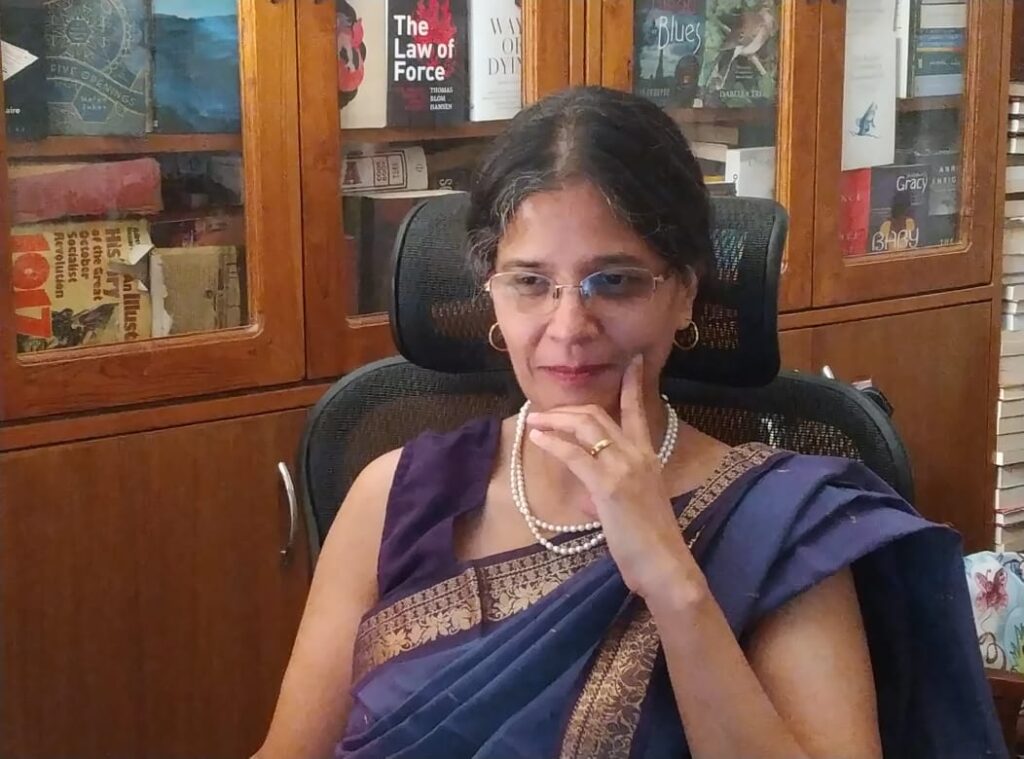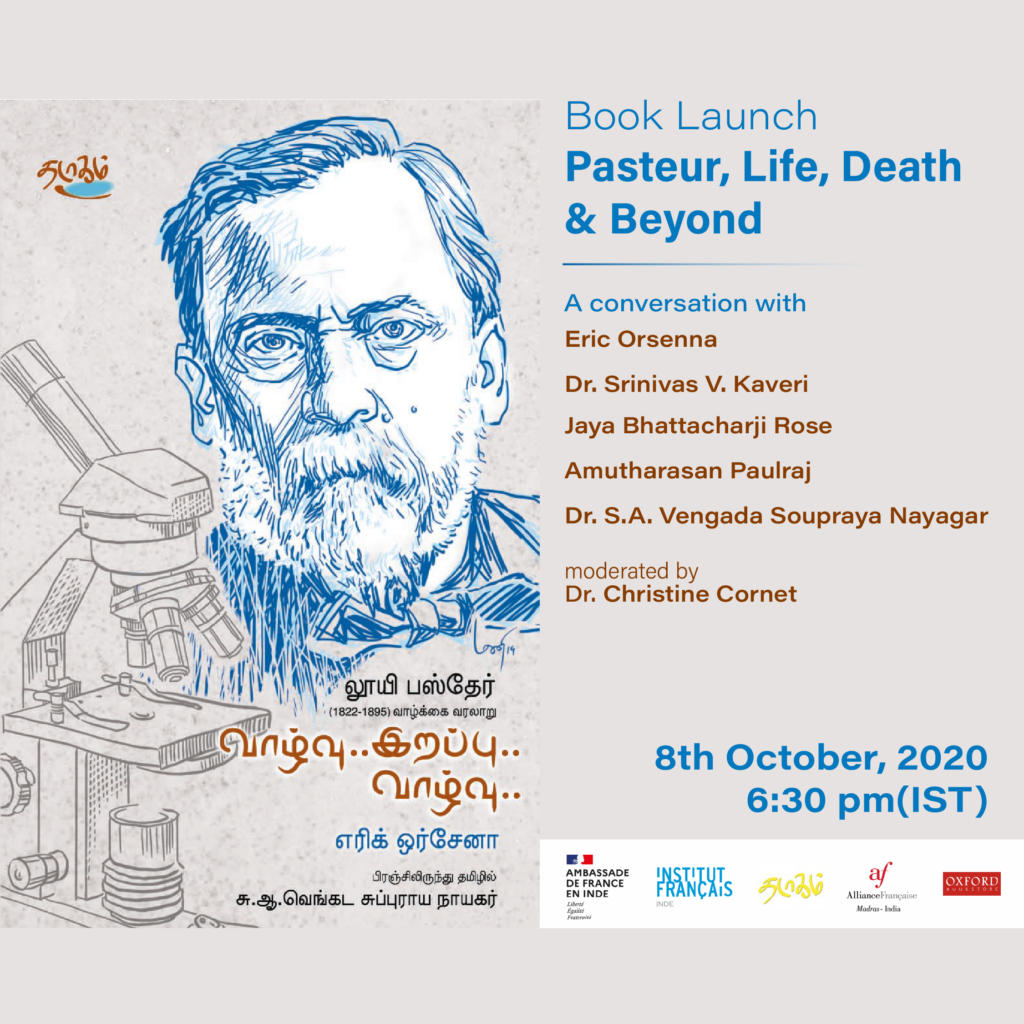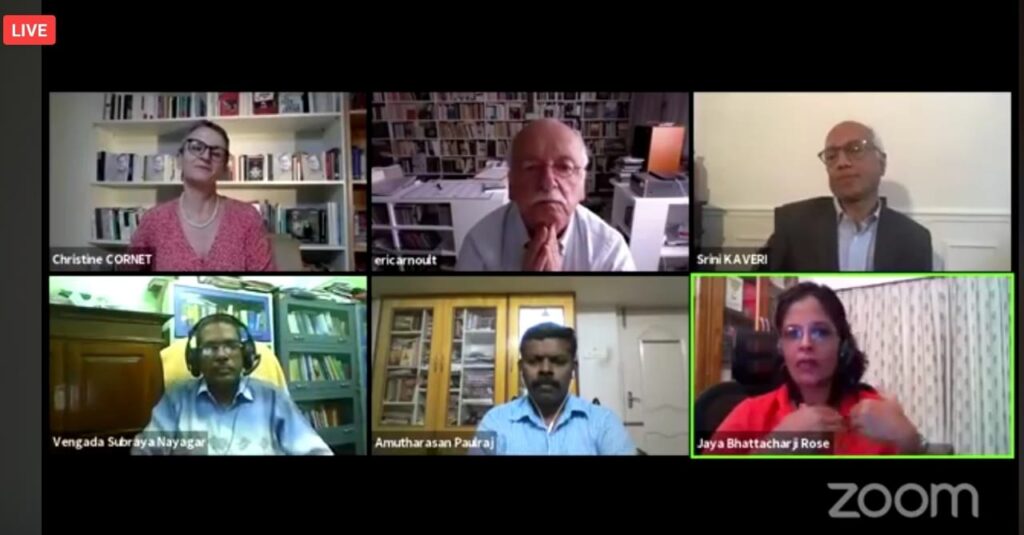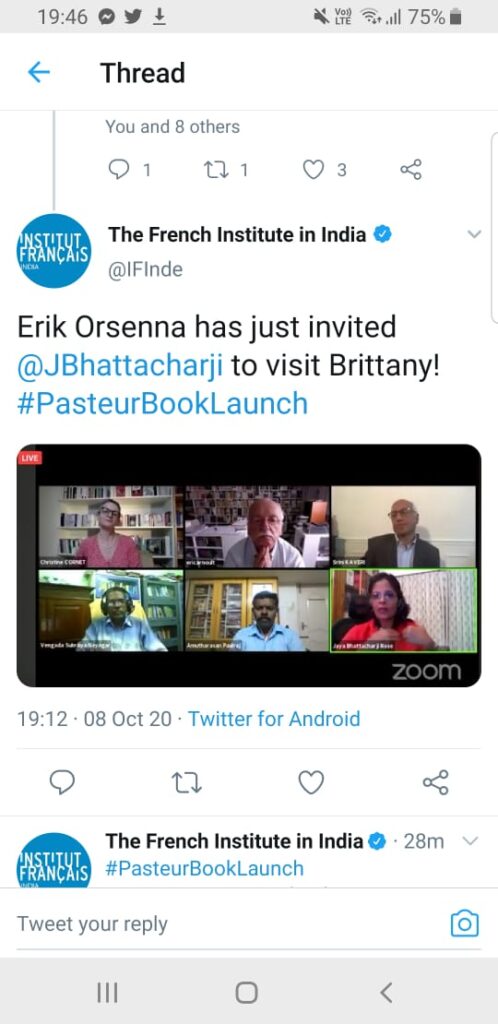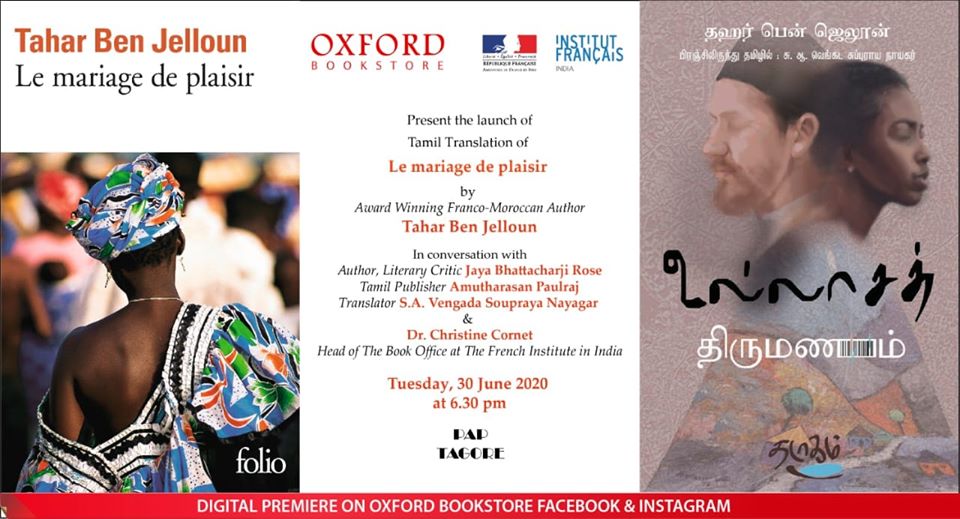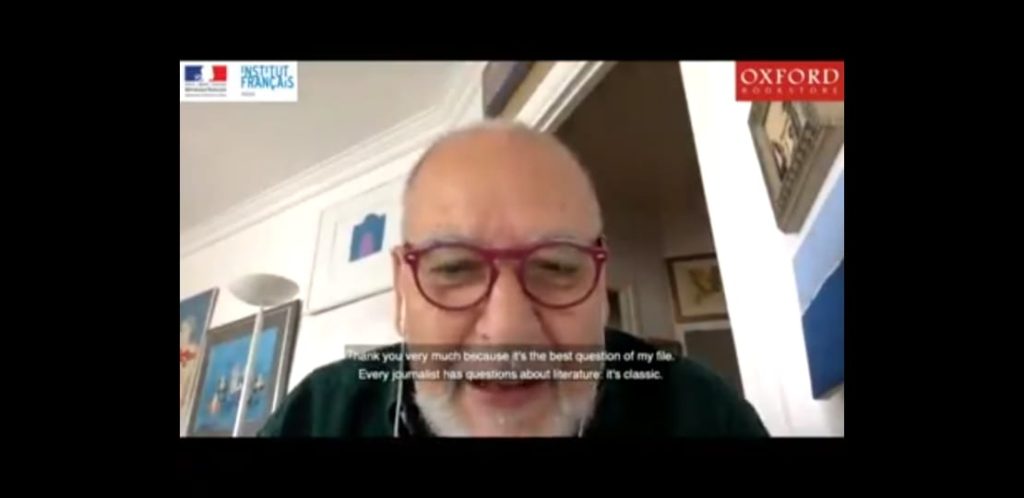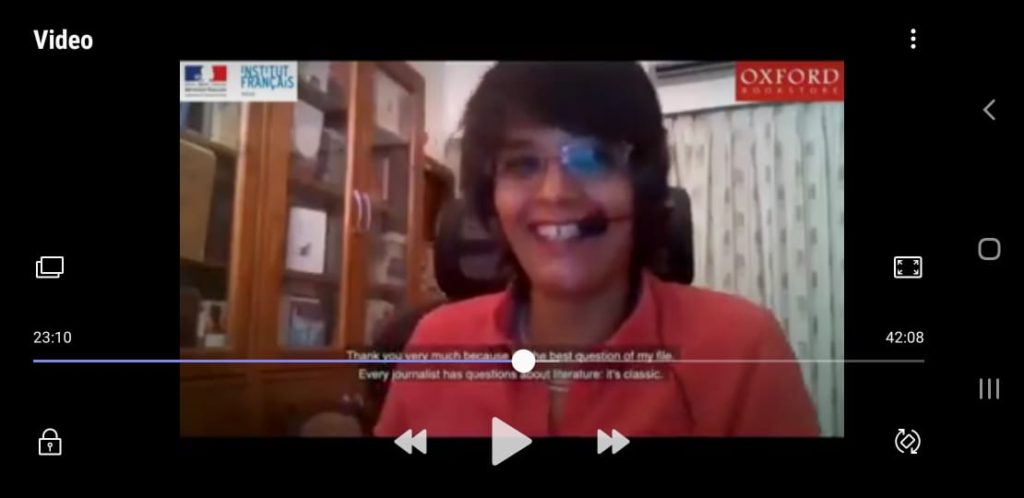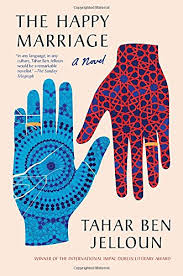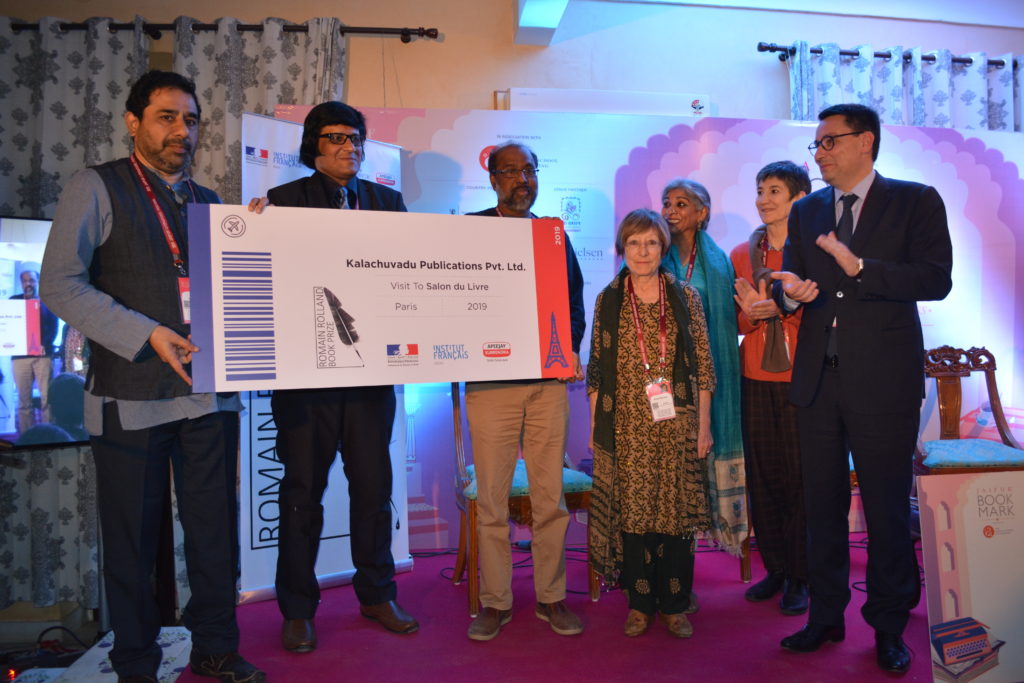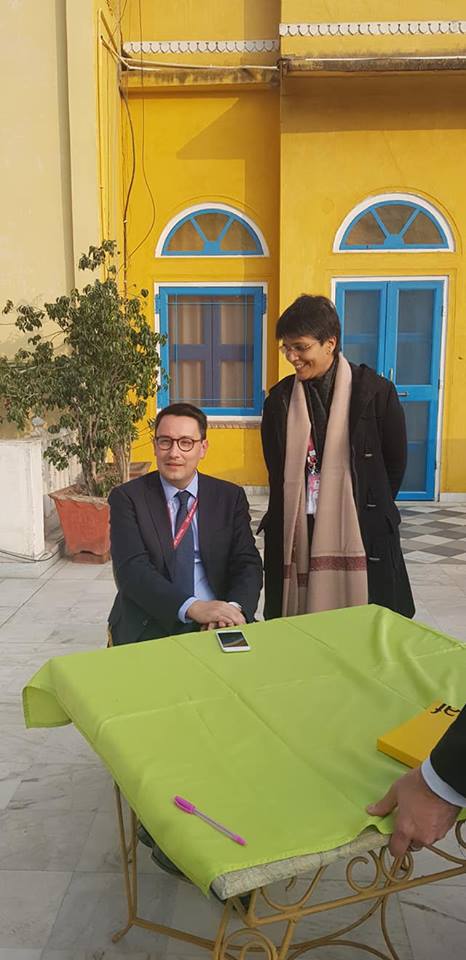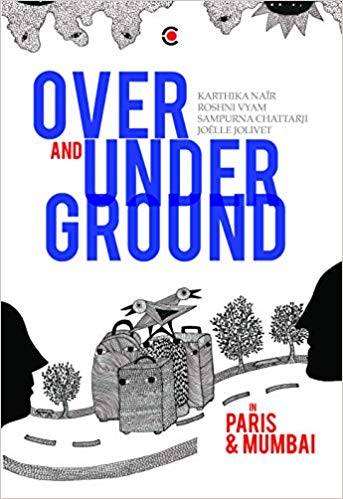In conversation with 2021 International Booker Prize winners David Diop and Anna Moschovakis, 3 Sept 2021
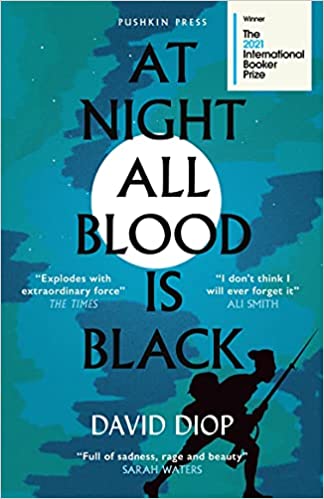
On 3 Sept 2021, I moderated a conversation with the 2021 International Booker winners David Diop and his translator from French to English, Anna Moschovakis for the book At Night All Blood is Black. It was conducted in two languages — French and English. This was organised in collaboration with the French Embassy in India/ French Book Office and UPES University. It was the inaugural event for Espace France at UPES. It was also an exclusive as this was the first ( and so far the only) event that had been organised in India/South Asia with David Diop and Anna Moschovakis. This event assumed significance for another special reason: France is the Guest of Honour at the New Delhi World Book Fair, Jan 2022 and India at the Paris Book Fair, April 2022.
The International Booker Prize is one of the most prestigious and richest literary prizes in the world @ US$ 50,000. It is meant exclusively for literature in translation/world literature. The author and the translator share the prize equally.
David Diop is a French-Senegalese writer who spent most of his childhood in Senegal before returning to France for his studies. In 1998, he became a professor of literature at the Université de Pau et des pays de l’Adour. In 2018, he won the prestigious French literary award, Prix Goncourt des lycéens, for his first novel, Frère d’ame. It was published by the renowned French publishing firm, Éditions du Seuil. In 2021, he won the International Booker Prize. The English translation, At Night All Blood Is Black. has been published by the fabulous independent press Pushkin Press, UK.
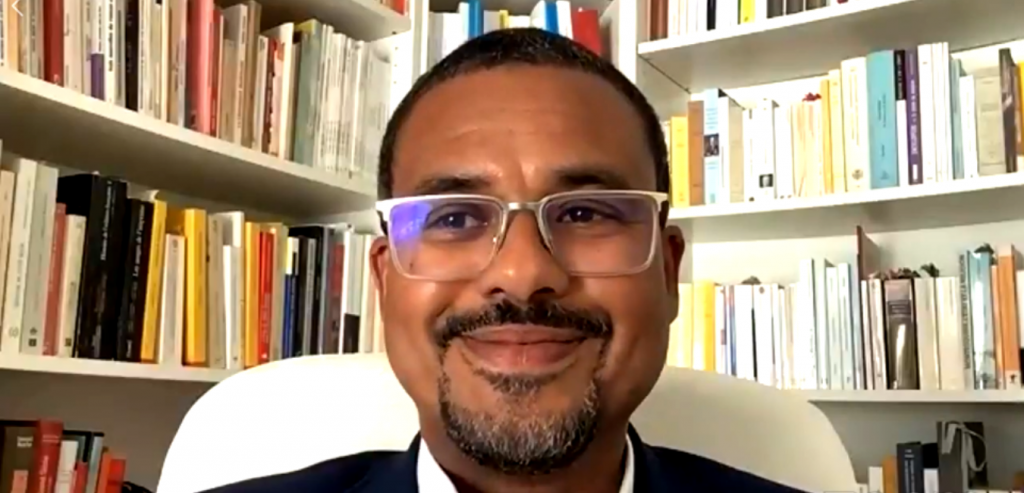
Anna Moschovakis is a Greek American poet, author, and translator. She divides her time between the USA and Greece. Moschovakis is a founding member of Bushel Collective and the publishing collective Ugly Duckling Presse. She is a faculty member of Bard College’s Milton Avery Graduate School of the Arts, as well as an adjunct associate professor in the Writing MFA program at Pratt Institute. Her writing has appeared in eminent literary journals such as The Paris Review, The Believer and The Iowa Review. Moschovakis’ book of poetry, You and Three Others Are Approaching a Lake, won the James Laughlin Award in 2011. Her first novel, Eleanor, or, The Rejection of the Progress of Love, was published in 2018.

It turned out to be a phenomenal success! We had over 500+ registerations on Zoom for the event. As happens with these events, ultimately only a smaller proportion sign in and attend the event. So approximately 150+ people logged in to watch the conversation in real time. Interestingly enough we discovered that except for about 5 or 6 people, everyone stayed glued to their screens for the entire duration of the discussion. This is unusual given that internet fatigue has set in during the pandemic. We had participants joining across time zones in real time —Canada, USA, UK, France, Germany, Nepal, India and Australia. For the next few days, the organisers were getting correspondence from a wide range of people lauding them. The impact factor was fantastic as the remarks were coming in from academics, institution heads, students, translators, journalists, readers, publishers etc. It was cutting across communities. In fact, while we were on air, the French Institute in India received a request to translate the novel into Hindi! This, after it was announced at the event that under the Publication Assistance Programme (PAP Tagore) of the IFI, the novel is already being translated into Malayalam ( DC Books) and Tamil ( Kalachuvadu)

Here are some comments:
Vidya Vencatesan à Conférenciers et participants (6:31 PM)
M. Diop vous êtes au programme de maîtrise depuis deux ans, succès inouï
Excellante initiative par IFI. FELICITATIONS!!
Sukrita Paul Kumar à Conférenciers (6:52 PM)
Very perceptive questions, Jaya
Jyotsna Paliwal à Conférenciers et participants (7:07 PM)
émerveillant, Merci bcp!
Carol Barreto Miranda à Conférenciers et participants (7:07 PM)
Superbe!!! Extraordinaire!!
Jayanti Pandey à Conférenciers (7:07 PM)
Merci beaucoup
Prof. Dipa Chakrabarti à Conférenciers et participants (7:07 PM)
Super David et Anna!!!
Preeti Bhutani à Conférenciers (7:07 PM)
très intense. Super!
Rohit Kumar à Conférenciers et participants (7:08 PM)
it’s the best catchy Title I ever encountered!!
HARSHALI Harshali à Conférenciers et participants (7:09 PM)
Bravo!! émerveillant
Dhritiman Das à Conférenciers (7:09 PM)
Thank you for this extraordinary opportunity to get introduced to the stream of consciousness method.
Gaurav Arya à Conférenciers (7:14 PM)
Fabulously put together panel, with so many varied perspectives are threading so seamlessly
Surely the experiences of men and women for WW I will be different, since women were not recruited as soldiers then. Women were left behind, caring for the sick and wounded, or grieving for loved ones lost.
Aslam Khan à Conférenciers et participants (7:23 PM)
what a wonderful discussion, thanks to the writer, translator and specially the organisers ❤
Shauna Singh Baldwin à Conférenciers (7:25 PM)
The senegalese soldiers were going into a battle for their colonial masters — this has not been documented before. Did you know the major differences between the Senegalese soldiers feelings in contrast to their French masters before or was that revealed by your research?
Mandira Sen à Conférenciers et participants (7:34 PM)
Fascinating, much to learn and think about
Thanks for organizing this. Mandira Sen
Anaheeta Irani à Conférenciers et participants (7:34 PM)
Merci.C’etait excellent
Chandan Kumar à Conférenciers et participants (7:34 PM)
Very informative session ..Merci de vous
Maitrayi Nag à Conférenciers (7:35 PM)
Oui, j’ai beaucoup aimé.
Nidhi Singh à Conférenciers (7:35 PM)
excellent session.. thankyou to organisers
Kamala Narasimhan à Conférenciers et participants (7:36 PM)
Thanks to David and Anna for their interaction and also to Jaya for moderating brilliantly. A special thanks to Uma for interpreting so wonderfully David! And thanks also to IFI for organising this!
Namrata Singhvi à Conférenciers et participants (7:37 PM)
Merci beaucoup ! Une discussion très intéressante !
Carol Barreto Miranda à Conférenciers et participants (7:37 PM)
Recit bouleversant! Grande impatience de lire le roman prochainement.
Chris Raja à Conférenciers et participants (7:38 PM)
Thank you very much David and Jaya. Best wishes from Melbourne
My Anglo Indian grandfather was involved in WW1
Elsa mathews à Conférenciers et participants (7:41 PM)
beautiful discussion!
lot to learn
Ena Panda à Conférenciers et participants (7:41 PM)
Very interesting discussion since we got to explore the book through the writer and the translator! Thank you Insititut Français
Prof. Dipa Chakrabarti à Conférenciers et participants (7:41 PM)
Merci Christine pour avoir organise cet evenement!!
Some messages that came in separately:
Very interesting discussion since we got to explore the book through the writer and the translator! Thank you Insititut Français!
Good morning. It was a wonderful conversation last evening. You steered it along very well. I really enjoyed it. ?
I enjoyed this conversation. I wish it could have gone on for another hour!
fantastic event it was. and was so accomodating for a naive like me. simple english. understandable; felt the connect wth author/ Translator and more with the audience. swift as breeze. i many time dont get converstaions but this was so easy and right from the heart. bulls eye it was.
More power to you and such wonderful lectures. God knows the poor students need such knowledge that frees them and gives them joy. I also liked Anna and her candid unaffected responses. So lovely! A five-star event overall, in my most humble opinion!! ??
***
Watch the conversation on Facebook. The panelists include David Diop, Anna Moschokovis, Uma Sridhar (translator), Dr. Christine Cornet, Attachée Livre et débat d’idées, Institut français India/Embassy of France and Jaya Bhattacharji Rose, co-founder, ACE Literary Consulting and Associate Professor, School of Modern Media Studies, UPES University.

The UPES University posted a fabulous blog post on the conversation by Ekta Kashyap, “David Diop’s guide to writing an award-winning novel” (15 September 2021). It is an account of the conversation with an edited version of the transcript. Well worth reading!
This was a tremendous event as we spoke in two languages, it moved seamlessly between the languages even though I do not speak French but we had Uma Sridhar translating for us brilliantly. It seemed as if we were having an excellent in-depth conversation about war literature, the canon of war literature, whether the gender of the writer makes a difference to the style of storytelling, translations, working with nonfiction material and converting it into fiction, use of folklore and magic realism etc. I am not listing the questions here but it is best that you hear the recording on Facebook. We covered a fair bit of ground and if time had permitted us, we would have spoken longer. Alas, it was not to be! Perhaps another time.
Many thanks to the French Institute in India, the French Embassy in India, UPES University, and Editions du Seuil for collaborating to organise this exclusive event in South Asia.

27 Sept 2021

